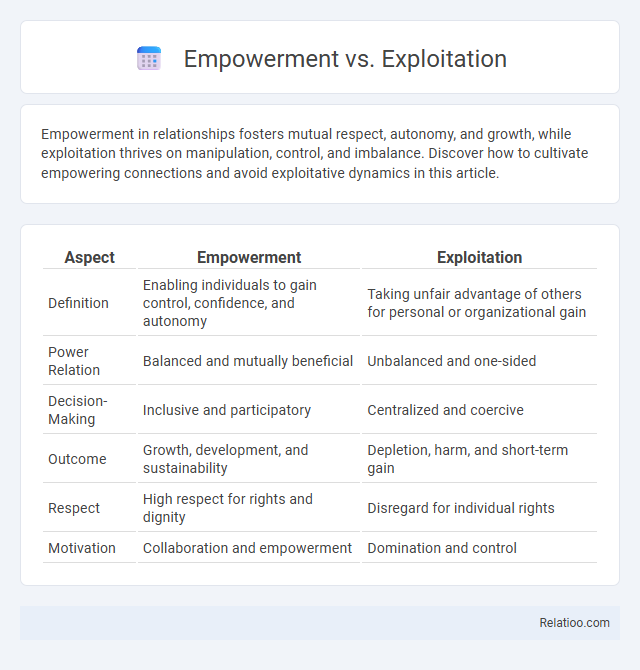Empowerment in relationships fosters mutual respect, autonomy, and growth, while exploitation thrives on manipulation, control, and imbalance. Discover how to cultivate empowering connections and avoid exploitative dynamics in this article.
Table of Comparison
| Aspect | Empowerment | Exploitation |
|---|---|---|
| Definition | Enabling individuals to gain control, confidence, and autonomy | Taking unfair advantage of others for personal or organizational gain |
| Power Relation | Balanced and mutually beneficial | Unbalanced and one-sided |
| Decision-Making | Inclusive and participatory | Centralized and coercive |
| Outcome | Growth, development, and sustainability | Depletion, harm, and short-term gain |
| Respect | High respect for rights and dignity | Disregard for individual rights |
| Motivation | Collaboration and empowerment | Domination and control |
Understanding Empowerment: Definitions and Context
Empowerment involves increasing Your agency and control over personal decisions, enhancing self-confidence and autonomy in various contexts such as social, economic, and political spheres. It contrasts sharply with exploitation, where individuals are taken advantage of for others' gain without equitable benefit. Understanding empowerment requires recognizing the conditions that support autonomy and respect, distinguishing it from objectification, which reduces individuals to mere objects for use rather than recognizing their full humanity.
Unmasking Exploitation: Key Characteristics
Unmasking exploitation involves identifying coercion, manipulation, and unequal power dynamics where individuals are used for others' gain without consent or fair compensation. Key characteristics include lack of autonomy, deception, and systemic inequality that strips people of agency and dignity. Recognizing these signs distinguishes exploitation from empowerment, which promotes self-determination, respect, and equitable treatment.
Historical Perspectives on Empowerment and Exploitation
Historical perspectives on empowerment often highlight social movements that sought to increase individual autonomy and collective rights, especially during the civil rights era and feminist waves. Exploitation has historically been documented through systems like colonialism, slavery, and labor industrialization, where dominant groups extracted value from marginalized populations without fair compensation. Understanding these contrasting dynamics requires examining the power structures that either facilitate personal agency or perpetuate systemic oppression.
Power Dynamics: Who Benefits and Who Suffers?
Power dynamics in empowerment, exploitation, and objectification differ based on who holds control and access to resources. Empowerment grants You agency, elevating your status and opportunities, whereas exploitation prioritizes the exploiter's gain at the expense of your well-being and rights. Objectification reduces you to mere utility or a tool, stripping identity and often perpetuating systemic imbalances where one group benefits disproportionately while others suffer.
Gender and Identity: The Intersection of Empowerment and Exploitation
Empowerment in gender and identity contexts involves granting individuals agency and visibility, fostering self-expression and autonomy. Exploitation occurs when power dynamics are manipulated to benefit others at the expense of marginalized genders, often reducing voices to commodities. Understanding this intersection helps you navigate the fine line where empowerment risks becoming objectification or exploitation, emphasizing respect and genuine inclusion.
Economic Empowerment vs. Economic Exploitation
Economic empowerment enables individuals to gain control over financial resources, fostering independence and sustainable development. In contrast, economic exploitation involves unfair labor practices, wage theft, or manipulation that undermines workers' rights and perpetuates poverty. Understanding the distinction is crucial for creating policies that promote equitable economic participation and protect vulnerable populations.
Social Media: Platform for Empowerment or Tool for Exploitation?
Social media serves as a powerful platform for empowerment by amplifying diverse voices and fostering community connections, enabling marginalized groups to share their stories and advocate for change. However, it can also facilitate exploitation through the commodification of personal data and the spread of harmful content that objectifies individuals, often prioritizing engagement over well-being. Balancing empowerment and exploitation requires transparent algorithms, user education, and stronger content moderation to promote positive representation while mitigating objectification.
Recognizing Red Flags: Signs of Exploitation Disguised as Empowerment
Recognizing red flags in situations where exploitation masquerades as empowerment is crucial for safeguarding personal autonomy and integrity. Key indicators include disproportionate power imbalances, pressure to compromise values or boundaries, and inconsistent or vague promises of advancement that benefit one party disproportionately. Awareness of these signs helps individuals discern genuine empowerment from manipulative tactics that objectify and exploit under the guise of opportunity.
Strategies for Promoting Genuine Empowerment
Effective strategies for promoting genuine empowerment prioritize authentic representation, consent, and agency, ensuring individuals control their narratives and choices without manipulation or coercion. Implementing educational programs that foster critical awareness about power dynamics and media literacy strengthens resilience against objectification and exploitation. Supporting equitable policies and community-driven initiatives creates environments where empowerment is sustained through respect, inclusivity, and structural change.
Building a Future: From Exploitation to Empowerment
Building a future centered on empowerment requires dismantling systems that perpetuate exploitation and objectification, emphasizing informed consent and equitable opportunities. Empowerment fosters autonomy and respect, enabling individuals to harness their talents without being reduced to mere objects or commodities. Transitioning from exploitative dynamics to genuine empowerment cultivates inclusive environments where dignity and agency drive sustainable growth.

Infographic: Empowerment vs Exploitation
 relatioo.com
relatioo.com